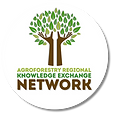
2026 Catalyzing Agroforestry Grant Program applications close on March 3, 2026.
Catalyzing Agroforestry
Grant Program

The application deadline for the 2026 Catalyzing Agroforestry Grant Program is March 3, 2026. Applications received after that time will be kept and considered for the next round of Catalyzing Agroforestry Grant Program. Read the information below to learn about this program and how you can apply.
About Catalyzing Agroforestry Grant Program & Partners
How CAGP Works
If your CAGP project is selected, there will be communication and consultations, followed by site visits from one of our regional partners. Awardees are reimbursed for expenses upon completion of the project.
Agroforestry assistance is available to producers in all States. The program provides up to:
-
Up to $1,500 per acre for the first 4 acres, up to $1,000 per acre for the second 4 acres, and up to $750 per acre for additional establishment beyond 8 acres: alley cropping, riparian forest buffers, silvopasture, food forests, and windbreaks.
-
For forest farming, the program will provide up to $1,000 for 1/4 acre and up to $500/acre for site preparation depending on project scale and scope.
CAGP Funds may be used to prepare sites, purchase planting stock, rent equipment, acquire and install tree protection, and pay contractors.
Funding will not be provided to buy or treat animals, pay for producer time, thin woodlands, or buy large equipment (e.g., augers, all-terrain vehicles, scalpers, tractors).
To enhance shared learning among current and future producers, awardees are asked share successes and lessons-learned with peers and other interested stakeholders via the Agroforestry Regional Knowledge Exchange Network or other means to be decided after project completion.
2022 CAGP Projects Map

2026 ARKx Map

CAGP Application
**Please read before applying!**
We are dedicated to making this application process accessible to all interested producers, including those with limited internet and technology access. Please choose the best application method for you.
To apply for the Catalyzing Agroforestry Grant Program, please complete and submit an application and Time and Budget worksheet. Be sure to fill out both parts: the application and budget worksheet to the best of your ability, and include supporting documentation. Please note that your application will not be complete until you return your completed application and the Time and Budget Worksheet.
Strong applications will include supporting documentation to aid project narratives. Examples include annotated maps or aerial imagery, existing planning documents, business plans, farm newsletters, promotional videos, product lists, and website links. Please be sure to label photos and documents with your farm name.
Send questions to CAGP contact: Patrick Bowers at Virginia Tech [bpatri8@vt.edu].
Thank you for your intrest in Catalyzing Agroforestry!














